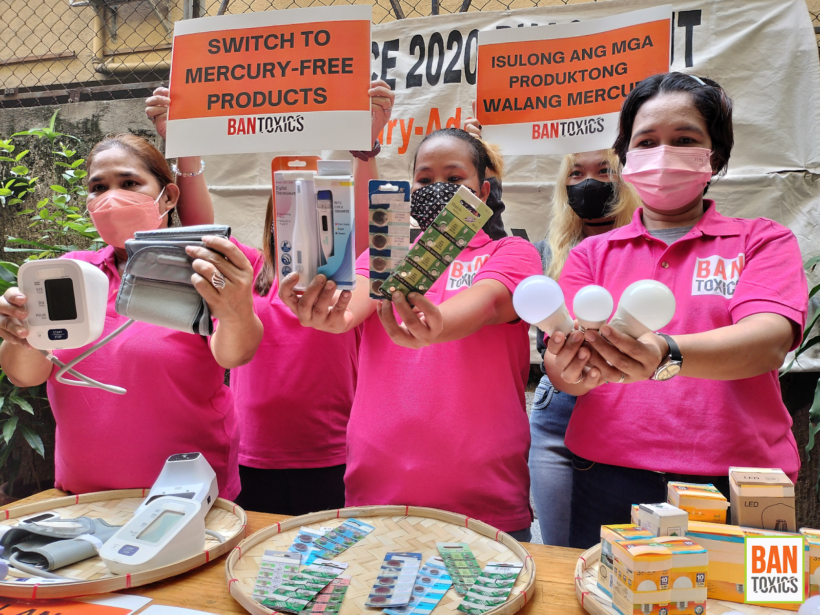QUEZON CITY, 22 June – In line with the celebration of National Poison Prevention Week, environmental watchdog group BAN Toxics launches an alternatives study titled “Mercury-Free Alternatives in the Philippines: Batteries, lamps, and medical measuring devices” in a press briefing.
The fourth week of June is celebrated as the National Poison Prevention Week as declared by Presidential Proclamation No. 1777 s. 2009 in an effort to raise awareness on the preventive aspects of poisoning prevention at home, school, work and in the general environment.[1]
The study aimed to assess the availability of mercury-free alternatives in the Philippine market in view of the country’s commitments to phase out mercury-containing products under the Minamata Convention on Mercury.[2]
The press briefing was joined by Jam Lorenzo, BAN Toxics’ Policy and Research Associate, and Geri-Geronimo Sañez, Chief of the Hazardous Waste Management Section of the Environmental Management Bureau (EMB), with the special participation of Elena Lymberidi of the Zero Mercury Working Group. The event was also attended by community women and BT Patrollers.
Lorenzo discussed the highlights of the mercury-free alternatives study, while Sañez presented a short overview of mercury and its health impacts as well as the Philippines’ commitments to the Minamata Convention on Mercury.
Funded by the European Environmental Bureau (EEB), the study presented trade data obtained from relevant government agencies, as well as the results of monitoring major e-commerce platforms. The results of the study are validated by cross-referencing relevant documents and conducting a validation workshop involving multiple government agencies.
The study also highlighted the Philippines’ progressiveness in managing mercury-added products, with distributors and manufacturers of batteries, lamps, and medical measuring devices successfully shifting most, if not all, of their business to safer alternatives.
The Minamata Convention on Mercury was ratified by the Philippine government on July 8, 2020. It is an international agreement established to protect human health and the environment from emissions and releases of mercury and mercury compounds caused by human activity.[3]
The sale of mercury-added products was made punishable by law through the issuance of the Chemical Control Order for Mercury and Mercury Compounds – DENR Administrative Order 2019-20 (CCO-DAO 2019-20).[4]
On June 13, 2022, the Food and Drug Administration (FDA) Philippines issued FDA Circular No. 2022-003 which totally bans mercury-added medical devices such as thermometers, sphygmomanometers, and dental amalgams for dental restorative procedures.[5]
“We commend the efforts of the Philippine government in reducing mercury-added products in the market. The next challenge is fully shifting towards safer alternatives, and this can be achieved through the continued cooperation of private industries, civil society organizations, and the government,” says Jam Lorenzo.
For the protection of human health, BAN Toxics encouraged the public to switch to mercury-free lamps, batteries, and medical devices, and dispose of used mercury-containing products and devices safely. The organization also advised consumers of the following:
-
Check the packaging label, and look for mercury-free lamps, batteries, and medical devices. Handle used mercury-containing products with care;
-
Do not throw mercury-containing products into regular waste bins. Instead, store the discarded products and devices temporarily in a secured storage; and,
-
Contact manufacturers and distributors to check if they have a take-back program for their spent products and devices.
BAN Toxics further promotes sound waste management to minimize mercury pollution from lamps, batteries, and other medical devices. The organization also recommended the following actions:
-
For the Philippine Government: Add mercury recovery to the operation of the Lamp Waste Management Facility and implement an extended producer responsibility for lamps, batteries, and medical devices waste management.
-
For industries: Designate convenient collection programs and/or drop-off points for mercury-containing lamps, batteries, and medical devices waste.
-
For manufacturers: Indicate the mercury content and include warning and disposal labels on lamps, batteries, and medical devices.
-
For educational institutions such as the Commission on Higher Education (CHED) and the Department of Education (DepEd): Promote the switch to mercury-free lamps, batteries, and medical devices in schools and academic institutions for the safety of the students and faculties.
“We further urge the industries and manufacturers to comply with the existing implementing rules and regulations of the Department of Environment and Natural Resources (DENR) regarding the proper storage, transport, management, and disposal of mercury-containing wastes.” BAN Toxics added.
############
Notes:
[1] Proclamation No. 1777, s. 2009
[3] Philippines brings to 123 the number of parties to the Minamata Convention
Media Contact:
Melendre Heidyl dela Torre, Communications Officer, BAN Toxics melendre@bantoxics.org | 09175142956






